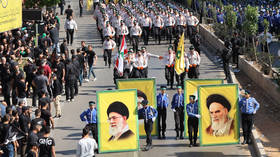Why the US & Israel are preventing aid from reaching one of the poorest countries in the Middle East
Efforts to stop Iran from spreading its influence are preventing the alleviation of Lebanon’s economic crisis

Despite the recent signing of a historic maritime border agreement, tensions continue to remain high, with both Israel and the United States attempting to force Lebanon into compliance with their regional agenda.
Although Israeli and Lebanese leaders signed letters of intent earlier this month ending their long-standing maritime border dispute and averting a major escalation in their ongoing conflict, the two sides still remain technically at war. Beirut refuses to recognise the Israeli state, maintaining the stance that first the Palestine issue must be resolved, as Israel maintains control over the Shebaa Farms area which Lebanon claims to be its territory.
Last week, drone strikes were reported to have killed up to 25 people after targeting a fuel aid convoy that had just passed the Al-Qaim crossing into Syria from Iraq. There are conflicting reports on who actually carried out the attack, with both Israel and the United States accused of having been behind it. The US military instantly distanced themselves from the incident, by denying they had carried out any strikes, whilst the Israeli government refused to comment and is now widely assumed to be culpable. According to Iraqi authorities, the fuel trucks, numbering 22 according to Iranian state-media, were approved for heading out of the country and seemed to be part of Iran’s new agreement with Lebanon to provide free fuel.
Despite opposition from top US officials, in August Lebanese Prime Minister Nijab Mikati accepted an offer from Tehran to supply Lebanon with fuel free of charge. Although the US ambassador to Lebanon, Dorothy Shea, had warned Beirut not to take the offer from Iran, it was decided that going ahead with receiving the Iranian gift was in the Lebanese national interest. It is likely that the temporary US silence following this was in large part to do with the then-ongoing maritime border dispute between Israel and Lebanon. The US has repeatedly attempted to counter Iranian influence in Lebanon, even going as far as claiming Beirut is not in need of the Iranian fuel, whereas the country is clearly in a state of economic collapse and suffers a shortage.
After Hezbollah, one of Lebanon’s most popular political parties, organized Iranian fuel shipments in 2021, Washington quickly took to countering any future attempts for Tehran to come to the aid of the Lebanese economy. A deal was then organized in September of 2021, under US supervision, for Egypt to supply natural gas through Jordan and Syria into Lebanon, in order to ease the energy crisis. However, the US government had pledged to amend its Caesar Act sanctions that it currently implements against Damascus to allow for the deal to go ahead, but has so far failed to do so. Although the Lebanese State is now quickly taking to exploring and, it hopes, extracting natural gas from the offshore Qana prospect, which it secured its rights to under its maritime border agreement with Israel, this process could take years to bear fruit.
In the short term, Lebanon needs a solution to its energy crisis and Iran is offering free fuel to supplement part of its needs. The US and its close ally Israel see this as a plot between Hezbollah and Iran to take control over the Lebanese State. Although Lebanon is technically an independent state, the reality is that France, the US and the Gulf States, particularly Saudi Arabia, hold huge shares of influence in the political and economic affairs of the country, and none of them feel comfortable with the idea of Tehran having a significant influence.
The regional strategy of the United States government, which Israel is also in lockstep with, is to combat the influence of the Iranian government. Part of this strategy is to pressure more Arab States to normalize ties with Israel and to give up on the consensus amongst Arab League States to adhere to the Arab Peace Initiative. The initiative maintained that recognition of Israel by Arab states, along with the establishment of military, economic and political ties, could not come without the realisation of a Two-State solution under which the creation of a viable Palestinian State would be established. So far the UAE, Bahrain, Morocco, Egypt, Sudan and Jordan have all normalized ties with Israel, abandoning the Palestinian cause for statehood. The US Biden administration is clearly seeking to add Saudi Arabia to the list, but eventually wants to go further than that.
At the recent COP27 climate meeting, held in Egypt’s Sharm el-Sheikh, Lebanese, Iraqi and Israeli representatives were all photographed standing near each other and had agreed to a distant cooperation on combating climate change. In Israeli and US media, this has been framed as somewhat of a breakthrough, despite being officially undermined by both Baghdad and Beirut. What is certain, however, is that the US and Israel are continuing to send a message to Lebanon, that they will not let it simply go about its business and thrive without adhering to their own agenda. Hence the US has not allowed for the Egypt-Jordan-Syria deal for transfer of fuel into Lebanon.
The most insidious part of the stance maintained by the US government is that Lebanon cannot simply leave the Iranian sphere of influence altogether and Washington is well aware of this. As long as Lebanese Hezbollah remains a popular force in the country, there will always be a link between Tehran and Beirut. This means that the US policy is designed to punish the Lebanese people for not getting rid of Hezbollah, something that neither the US nor Israel will dare try to do themselves. If Israel and the US are both in lockstep about preventing Iranian fuel from reaching Lebanon, then this means that they are simply depriving Lebanon of its ability to get back on its feet, all in the name of combating Iran and Hezbollah. In their eyes, if the Lebanese people perceive the Iranian fuel imports to be their saving grace, this runs counter to US hegemony and, together with the latest perceived victory for Hezbollah in forcing the Israelis to negotiate a maritime border settlement, Tehran would come off with greater support in Lebanon.
The US and Israel are proving incapable of allowing the Lebanese people to achieve a greater standard of life, due to the fact that Hezbollah and Iran are still there. Meanwhile, getting rid of Hezbollah would not only be militarily impossible, but there is also no evidence that such a move would actually bring stability – as evidenced with the case of Sudan, which normalized ties with Israel and earned itself a place in the good books of the US government, but the West is yet to aid the country, which endures a continuous state of crisis.
The statements, views and opinions expressed in this column are solely those of the author and do not necessarily represent those of RT.
https://www.rt.com/news/566510-israel-iran-leave-lebanon/




0 Comments:
Post a Comment
Subscribe to Post Comments [Atom]
<< Home